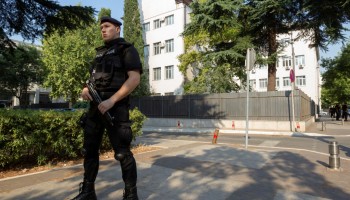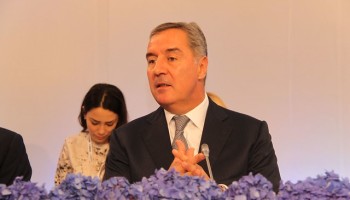In Serbia’s spring elections, nearly 20 percent of voters were offered bribes in exchange for votes, according to a new survey compiled by the UN Development Program in Serbia and the Taylor Nelson Sofres Medium Gallup group. And if that figure is any reasonable indication, voters in BiH and Montenegro can expect fatter wallets this fall.
“One hundred KM (US $66) is what we hear” said BiH Central Election Commission spokesperson Muvera Vulović. “One hundred KM per vote, but it’s only hearsay. Only what’s reported in the media.”
Vulović said that in BiH, an accurate portrait of the bribery landscape is almost impossible to paint when no one comes forward.
“It’s a criminal offense,” she said, “for those who accept the bribes and for those who pay them, so no one wants to report them to the [election commission].”
Many bribes would be difficult to report (or prove) anyway, as they no longer involve strictly monetary transactions. The bribery survey indexed several modes of payment, and many of them sounded familiar to Igor Misković, the SDP party secretary in Sarajevo.
“Some bribes are money, certainly, or gifts. But the most common is probably work. A promise of a job,” he said. For the SDP, though, Misković claimed that bribery was never part of the campaign strategy.
“I’ve been politically active for 10 years and I have not seen it.” he said. “But bribery may not be as significant a factor this year because it is a local election.”
As such, SDP members are engaging in old-fashioned, on-the-street campaigning. “Direct contact with people is our main activity,” Misković said. “We want to gather people and give them information.”
But there’s a fine line between information and influence, according to Vanja Čalović, executive director of MANS, a civil society organization in Montenegro. She said that her organization is expecting the government to misuse funds to bribe voters there. And much like in BiH, vulnerable populations will continue to be especially susceptible.
“The poorest categories of the population are provided with flour, oil and other types of food as a bribe.” Čalović said.
Furthermore, in Montenegro, dissuasion is almost as common as persuasion. Čalović explained that the DPS, the governing party, has a vast infrastructure which devotes resources to tracking political opponents.
“It’s supported by public servants, including police, intelligence workers and other members of local government where they have power,” alleged Čalović. “According to observers, DPS has literally one person per building in charge of collecting data on their neighbors.”
Čalović said that local DPS heads assemble the data and then disseminate it to their offices in various municipalities, where offers and promises are made to citizens living in the community.
“We were informed of that a number of citizens were offered €50-100 in order not to vote,” Čalović said. “And in some cases, directors of public institutions were having talks with their employees in order to create pressure for them to vote, and to threaten that they might lose their jobs.”
MANS and other groups have been vigilant in tracking party activity, especially irregularities in campaign finance reports and voter lists. Calovic said that they’ve found more than 15,000 suspicious voting cases so far and nearly 6,000 “phantom voters,” deceased citizens who are still on voter lists.
The Montenegro Center for Democratic Transition is monitoring the reporting of campaign funds as well. The center released a statement this month outlining their methodology. Employees are doing much more work prior to the elections this year – as opposed to years’ past when information was only aggregated on Election Day and after.
In BiH, the electoral commission reports a great deal of interest in its observer program where volunteers monitor voting stations. They had to extend the application deadline, said Vulović.
The electoral commission also intends to thoroughly analyze campaign finance reports. During election years, parties in BiH are required to submit a pre-election and post-election report, in addition to their annual statements. These will be examined by the electoral commission’s auditing office and its findings will be released in early 2013.
Still, these mechanisms might not be enough to combat bribery’s deeply entrenched regional presence. Nemanja Nenadić, program director of Transparency International’s Serbia office, says that funds used for bribes are often not listed in campaign finance reports; they likely come from hidden donors or misappropriated public resources. After the bribery survey was released in Serbia, Nenadić issued a statement calling on police, prosecutors and other government authorities to investigate the survey’s claims.
He was reluctant to speculate about the elections in BiH and Montenegro, but he did say that the type of bribery seen in Serbia was by no means isolated.
“It is possible anywhere in the world,” he said. “It’s just a matter of how and to what extent, of what kind of control exists.”
Sladana Brakus, the executive director of TNS Medium Gallup – the group that coordinated the research in Serbia – was skeptical that her survey and ones like it will make much difference.
“There will be more awareness, and it is good to get to the public with this kind of data,” she said. “It can have a mild positive effect, but not significant. Not consequential.”
But steps forward, however small, are still steps in the right direction. Igor Misković, for one, understands that change won’t occur overnight. He suspects that changes in the region’s bribery practices will be much like changes in the systems of Balkan politics at large: “slow and steady.”





